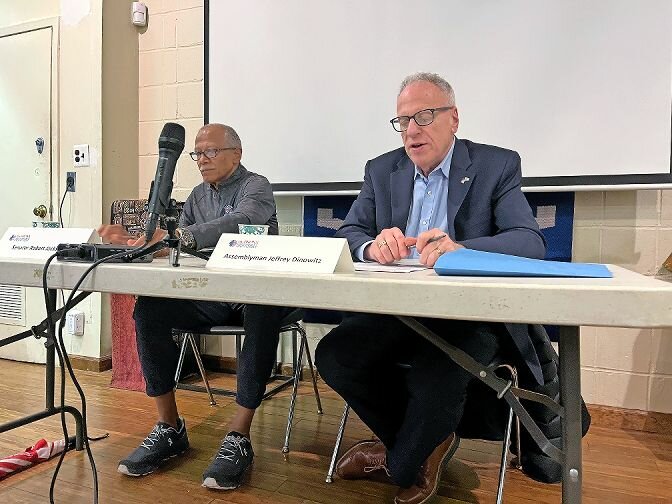State electeds talk 2024 state legislative objectives
Moderators and audience members get a chance to query
Local electeds answered moderator and audience questions last Sunday at the Riverdale-Yonkers Society for Ethical Culture. The event, hosted by Northwest Bronx Indivisible, was attended by state Sen. Robert Jackson and Assemblyman Jeffrey Dinowitz.
State Sen. Gustavo Rivera was supposed to attend but was unable to due to being ill.
Before taking questions both electeds highlighted some of the bills that they are working on in the forthcoming legislative session.
For the assemblyman many of the bills were focused on housing or climate change issues, such as the Climate Change Superfund Act that seeks to make Big Oil companies pay for climate damages.
He also discussed the Green Transit, Green Jobs bill, which seeks to have transit agencies use zero emission buses starting in 2029.
Dinowitz is also continuing to work on his bill to close the voluntary intoxication rape loophole and another bill to help survivors of human trafficking.
“I put in a bill recently and I know this is kind of a long shot but sometimes you got to make a political statement,” Dinowitz said.
“And the legislation would remove from the presidential ballot in New York, insurrectionists.”
As for the senator, some of his bills are focused on affordable housing, expanding tuition assistance program eligibility and ending qualifying immunity. One of Jackson’s bills, One Fair Wage, seeks to bring workers up to at least the minimum wage.
“The most important priority for me is the safety and security of the people that I represent in their homes and in our community,” Jackson said. “We’re not safe in that environment? We’re all in trouble.”
The first question asked by moderators was whether electeds endorsed the use of ranked choice voting for city primary elections.
Ranked choice voting was adopted in the city in 2019 and has voters select candidates in order of preference. Jackson answered that he has not reached a conclusion yet, while Dinowitz said he would oppose it on a statewide level.
“We should make the rules not in order to achieve a specific political outcome whether it’s to elect more progressives or to elect more conservatives for that matter,” Dinowitz said.
“And I think rank choice voting in that sense is kind of a scam. And the idea of eliminating mayoral runoffs, that was a big mistake. We could have had a one on one race between the top two finishers last time and they could really flesh out the issues but we didn’t get the opportunity for that to happen.”
Another question asked by moderators was how residents could deal with the problem of large corporations acquiring medical practices despite the state having rules prohibiting corporate ownership of such businesses.
Dinowitz said he is not comfortable with the takeover of medicine by big corporations and at a minimum they need to try to regulate it.
He said the assembly brought legislation to the floor that partially deals with the issue by challenging places like CVS who had a corporate control over some of the practices of medicine.
Jackson told attendees he is in favor of Rivera’s New York Health Care Act, which would establish a single payer health care system in the state, and said he doesn’t want a corporation that only sees things through dollar signs to be determining people’s health.
Though Rivera was not in attendance, he did prepare a statement for the question, where he spoke about his bill relating to retail clinics.
“Retail clinics are situations where medical practices operate inside a larger retail organization such as a pharmacy or box store,” Rivera stated.
“We have seen the rise of these entities elsewhere in the U.S. and are concerned that it may operate here, that the host entity may exert undue influence and pressure on the medical provider. My bill would limit the scope of services that can be provided by these types of entities and create bridges to traditional primary care providers in the community.”
Many of the questions from the audience were based around housing and housing affordability. One of those questions was regarding Gov. Kathy Hochul failing to pass a set of housing bills in the last legislative session and wanted to know what housing bills the electeds would continue to support.
Hochul “opposed Good Cause Eviction, which would essentially place rent regulation on properties that are currently not regulated,” Dinowitz said. “I think it was well intentioned, but I don’t really think it was a balanced plan. There are ways of building more housing without crowding out every neighborhood.”
Dinowitz acknowledged there is a housing crisis but said the bigger crisis is affordability. He added that a reason so many are homeless is because a lot of families have been forced out of their homes.






